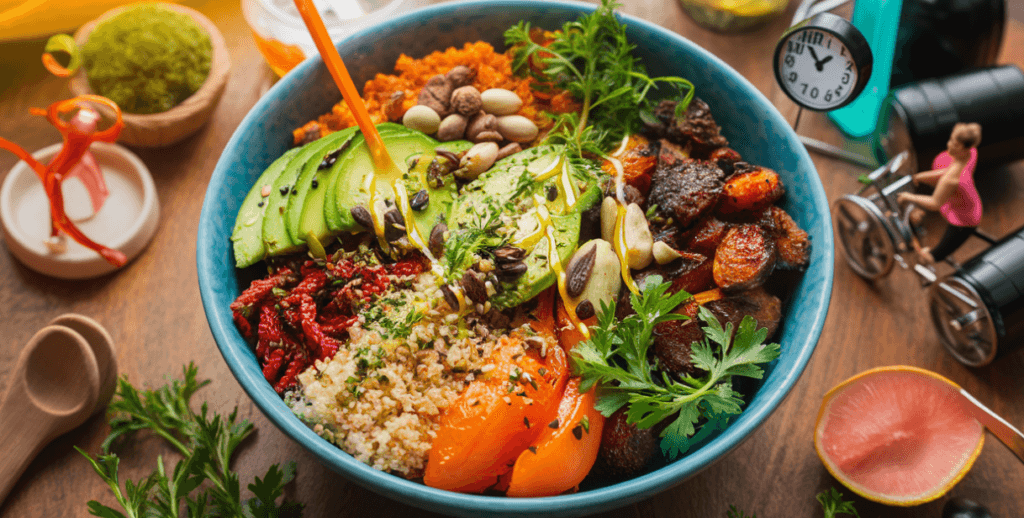In today’s fast-paced world, it’s easy to feel drained and depleted. Whether you’re juggling work, family, or other commitments, maintaining high energy levels throughout the day can feel like an uphill battle. But before you reach for another cup of coffee or sugary snack, consider this: the key to sustainable energy might be sitting right on your plate.
The food you eat plays a crucial role in how you feel. By making smart choices and adopting healthy eating patterns, you can fuel your body with the nutrients it needs to thrive, avoid energy crashes, and power through your day with vitality.

The Science of Energy: It’s All About Balance
Energy comes from the food we eat, specifically from the macronutrients: carbohydrates, proteins, and fats. Carbohydrates are the body’s primary source of quick energy, while proteins and fats provide longer-lasting fuel. The key to sustained energy lies in balancing these macronutrients and choosing the right types of foods.
“The body is like a car,” says registered dietitian, Sarah Johnson. “You need the right fuel to keep it running smoothly. If you’re putting in low-quality fuel, your car will sputter and stall. The same is true for your body. If you’re eating processed foods and sugary drinks, you’ll experience energy spikes and crashes. But if you fuel your body with whole, nutritious foods, you’ll have sustained energy throughout the day.”
The Energy-Boosting Powerhouses
Let’s delve into some of the top foods that can help you feel energized and focused:
- Complex Carbohydrates: These provide a slow and steady release of energy, helping to avoid sugar crashes. Choose whole grains like oats, brown rice, quinoa, and whole-wheat bread over refined carbohydrates like white bread and pastries. Fruits and vegetables also provide complex carbohydrates along with essential vitamins, minerals, and fiber.
- Lean Protein: Protein is essential for building and repairing tissues, but it also plays a role in energy production. Include lean protein sources like chicken, fish, beans, lentils, and tofu in your meals and snacks.
- Healthy Fats: Fats are a concentrated source of energy and help you feel full and satisfied. Opt for healthy fats like avocados, nuts, seeds, and olive oil.
- Water: Dehydration can lead to fatigue and decreased cognitive function. Make sure you’re drinking plenty of water throughout the day.
Expert Insights:
Dr. Michael Greger, author of “How Not to Die,” highlights the importance of a plant-based diet for sustained energy. “Plant foods are packed with fiber, which slows down the absorption of sugar into the bloodstream, providing a steady source of energy. They’re also rich in antioxidants, which protect our cells from damage and help us feel our best.”
Eating Patterns for Optimal Energy
In addition to choosing the right foods, the way you eat also plays a role in your energy levels. Here are some tips:
- Eat Breakfast: Don’t skip the most important meal of the day. A balanced breakfast with protein, complex carbohydrates, and healthy fats will set you up for success.
- Eat Regular Meals and Snacks: Aim to eat every 3-4 hours to keep your blood sugar levels stable and avoid energy dips.
- Portion Control: Overeating can lead to sluggishness. Pay attention to your hunger cues and stop eating when you’re comfortably full.
- Mindful Eating: Slow down and savor your food. This helps you tune into your body’s signals and avoid overeating.
Foods to Avoid
While some foods provide sustainable energy, others can drain your energy levels. These include:
- Sugary drinks: Sodas, energy drinks, and sweetened juices provide a quick burst of energy followed by a crash.
- Highly processed foods: These foods are often low in nutrients and high in unhealthy fats and added sugar, which can contribute to fatigue.
- Excessive caffeine: While a moderate amount of caffeine can improve alertness, too much can lead to jitters and anxiety, followed by a crash.
Lifestyle Factors for Sustained Energy
While food is crucial for energy, other lifestyle factors can also impact your energy levels.
- Get enough sleep: Aim for 7-8 hours of quality sleep each night.
- Exercise regularly: Physical activity can boost energy levels and improve mood.
- Manage stress: Chronic stress can drain your energy. Practice stress-management techniques like yoga, meditation, or deep breathing.
Conclusion:
Eating for energy is not just about avoiding sugary drinks and processed foods; it’s about making mindful choices and nourishing your body with the right nutrients. By incorporating the energy-boosting foods and eating patterns outlined in this article, you can fuel your fire and power through your day with vitality and focus.
Soumya Smruti Sahoo is a seasoned journalist with extensive experience in both international and Indian news writing. With a sharp analytical mind and a dedication to uncovering the truth, Soumya has built a reputation for delivering in-depth, well-researched articles that provide readers with a clear understanding of complex global and domestic issues. Her work reflects a deep commitment to journalistic integrity, making her a trusted source for accurate and insightful news coverage.


